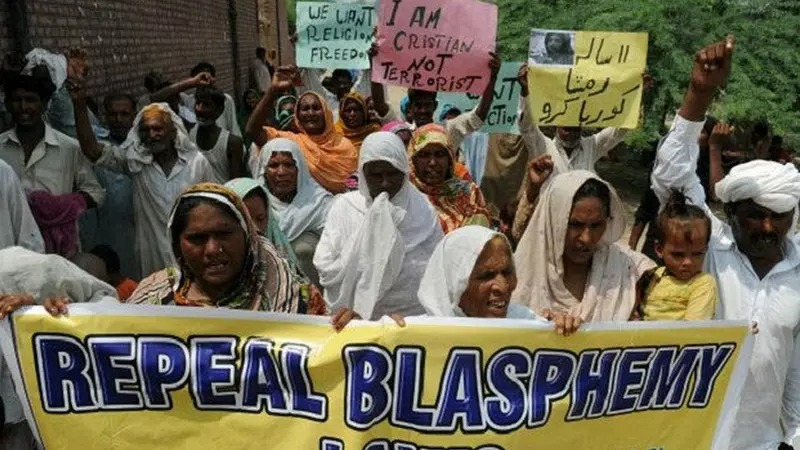By: Irfan James
On June 23, 2024, Pakistan’s Defence Minister made an admission, acknowledging the state’s failure to protect its minority communities. This statement highlights a disturbing reality: minorities in Pakistan face severe threats, often justified by the misuse of religion. The Minister’s statement points to a critical systemic flaw. Despite the Pakistani Constitution guaranteeing equal rights for all citizens, minorities frequently encounter violence and discrimination.
The problem is exacerbated by a dysfunctional police force. Instances of mob violence, particularly those sparked by blasphemy accusations, reveal the police’s inability or unwillingness to act impartially. This environment enables accusations to become weapons, with perpetrators feeling emboldened by a sense of impunity, especially when the majority seems sympathetic to them. This selective enforcement breeds fear, discouraging minorities from seeking justice and fostering a climate where violence is tragically normalized. The Defence Minister’s admission, while a necessary first step, needs to be followed by concrete action.
A comprehensive approach is crucial: Police reform is essential. Officers must be trained to handle sensitive situations with impartiality and uphold the law irrespective of religion. A robust legal framework with swift and fair prosecution for hate crimes and mob violence is needed. Interfaith dialogue and educational initiatives promoting tolerance and respect for diversity are crucial to addressing the root causes of religious bigotry.
Pakistan must act decisively to protect its minorities and ensure equal rights for all its citizens. The time for empty promises is over. Only through concrete action can the country move towards a future where religion is not a weapon, and the law protects all equally.
The brutal mob attack on Nazir Masih in Sargodha, Pakistan, exposes severe constitutional failings by the Punjab Police. The subsequent handling of the case raises serious concerns about the pursuit of true justice. Reports indicate that police cleaned the crime scene on the day of the attack, potentially tampering with crucial evidence. The Investigation Officer’s (IO) alleged failure to conduct proper interrogations, examine video forensics, and interview witnesses compromise the case’s integrity. The perception that police favored the religious hardline group and attempted to pressure the Masih family into accepting offers further weakens the case. This alleged bias denies Nazir Masih’s family their fundamental right to fair representation and justice. The quick release on bail of 52 suspects highlights flaws in Pakistan’s legal system. This trend of impunity for blasphemy-fueled violence against minorities erodes trust in the justice system and emboldens perpetrators.
A call to action includes ensuring a transparent and fair trial, meticulously examining all evidence and pursuing all avenues for truth and justice. Robust reforms are needed within the Punjab Police to prevent bias, ensure proper investigations, and uphold the law impartially. Pakistan’s stakeholders must ensure all legal procedures are followed diligently, guaranteeing fair trials and equal protection for all citizens. The Nazir Masih case starkly reminds us of the immense challenges faced by minorities in Pakistan. Delivering true justice requires a resolute commitment to upholding the Constitution and ensuring accountability at all levels. Only then can Pakistan work towards a future where religious minorities are safe and secure within the boundaries of the law.
Pakistan’s blasphemy laws, originally enacted in 1860 during British rule and expanded in the 1980s, impose severe penalties, including death, for insulting Islam. Critics argue these laws are frequently misused to target minority communities. Most Pakistanis support strict punishment for blasphemy, believing these laws reflect religious teachings, despite their origins in human legislation. High-profile assassinations of critics, such as Punjab Governor Salman Taseer and Religious Minorities Minister Shahbaz Bhatti, underscore the dangers of opposing these laws. Efforts to reform blasphemy laws have faced strong resistance from religious parties. In 2010, a bill introduced by Sherry Rehman of the Pakistan People’s Party faced tremendous pressure, stalling any progress.
Recent cases in Swat, Sargodha, and Jaranwala illustrate the ongoing violence fueled by blasphemy accusations. In Swat, a week ago a mob killed a tourist accused of blasphemy, highlighting the failure of police to protect the accused. In Sargodha, a mob attacked a Christian community, resulting in injuries and significant property damage. Similarly, in Jaranwala, allegations of Holy Quran desecration led to widespread violence against the Christian population, with numerous churches and homes destroyed. These incidents reflect a dire need for comprehensive reforms and effective law enforcement to protect minority communities and uphold justice in Pakistan.



Thanks God
Rev Irfan SB U r also thanks for this bravery against violence against minority in Pakistan, really U r great man.
May God always bless you and your family 🙏.
We r also pray daily for ours Christians and other minorities in Pakistan
It’s a very great initiative to build a platform where Pakistani national minorities can share their thoughts as, while living in country abundant with radicalism, vandalism and religious extremism.
May our voices reach to world’s leadership.
May this news channel get prosperity. ameen
Dear brother Irfan James,
Thank you so much for your great efforts for the Christians.
You are a true Christ follower.
The grace of the Lord Jesus Christ be with you. Amen.